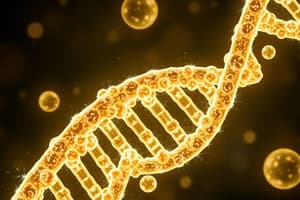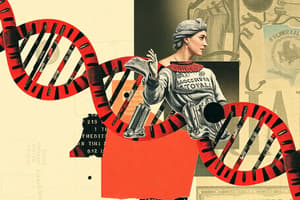Podcast
Questions and Answers
What catalyzes the formation of phosphodiester bonds between a DNA strand and a new nucleotide being added during DNA replication?
What catalyzes the formation of phosphodiester bonds between a DNA strand and a new nucleotide being added during DNA replication?
DNA polymerase
A sample of double-stranded DNA contains 28% thymine. Approximately what percent of the nucleotides in this sample will be guanine?
A sample of double-stranded DNA contains 28% thymine. Approximately what percent of the nucleotides in this sample will be guanine?
22%
What is the role of DNA ligase in the elongation of the lagging strand during DNA replication?
What is the role of DNA ligase in the elongation of the lagging strand during DNA replication?
It joins Okazaki fragments together.
In E. coli, a mutation in a gene called dnaB prevents the helicase from binding at the origin of replication. What would you expect to occur as a result of this mutation?
In E. coli, a mutation in a gene called dnaB prevents the helicase from binding at the origin of replication. What would you expect to occur as a result of this mutation?
Which of the following statements accurately describes differences between DNA replication in prokaryotes and DNA replication in eukaryotes?
Which of the following statements accurately describes differences between DNA replication in prokaryotes and DNA replication in eukaryotes?
What is the function of the enzyme topoisomerase in DNA replication?
What is the function of the enzyme topoisomerase in DNA replication?
In bacteria, which of the following proteins is responsible for removing nucleotides from the RNA primer that is used for initiation DNA synthesis?
In bacteria, which of the following proteins is responsible for removing nucleotides from the RNA primer that is used for initiation DNA synthesis?
Which of the following statements correctly describes the difference between the leading and lagging strands of DNA in DNA replication?
Which of the following statements correctly describes the difference between the leading and lagging strands of DNA in DNA replication?
The sequence of nucleotides below is present at a DNA location where the chain opens to form a replication fork: 3' C C T A G G C T G C A A T C C 5'. An RNA primer is formed starting at the 2 T of the template. Which of the following represents the primer sequence?
The sequence of nucleotides below is present at a DNA location where the chain opens to form a replication fork: 3' C C T A G G C T G C A A T C C 5'. An RNA primer is formed starting at the 2 T of the template. Which of the following represents the primer sequence?
Flashcards are hidden until you start studying
Study Notes
DNA Replication Concepts
- DNA Polymerase Function: Catalyzes phosphodiester bond formation between nucleotides during DNA replication, linking the 3' hydroxyl of one nucleotide to the 5' triphosphate of another.
- Practical Limitations: DNA replication can proceed, but the cell struggles to remove and replace RNA primers used during the process.
Nucleotide Composition
- DNA Thymine Percentage: If a double-stranded DNA sample contains 28% thymine, the guanine content will be approximately 22%, based on base pairing rules.
Role of Enzymes in DNA Replication
- DNA Ligase: Essential for joining Okazaki fragments on the lagging strand, facilitating the continuous elongation of DNA.
- Topoisomerase Function: Relieves tension in DNA ahead of the replication fork caused by unwinding, addressing the over-winding issue inherent to the double-helix structure.
Impacts of Mutations
- Heicase Mutation in E.coli: A mutation in the dnaB gene results in the inability of helicase to bind to the replication origin, preventing formation of the replication fork, thereby halting DNA replication.
Comparative Analysis of DNA Replication
- Prokaryotes vs. Eukaryotes: Prokaryotic chromosomes feature a single origin of replication, while eukaryotic chromosomes possess multiple origins, allowing for more complex regulatory mechanisms.
Primer Mechanics
- RNA Primer Replacement: In bacteria, DNA polymerase I is responsible for removing RNA primers and replacing them with DNA nucleotides during DNA synthesis.
Leading vs. Lagging Strands
- Synthesis Orientation: The leading strand synthesizes in the same direction as the replication fork movement, contrasting with the lagging strand, which is synthesized in the opposite direction.
RNA Primer Sequence
- Primer Formation Example: Given the template strand sequence 3' C C T A G G C T G C A A T C C 5', the RNA primer formed starting at the second thymine (T) would be 5' A C G U U A G G 3'.
Studying That Suits You
Use AI to generate personalized quizzes and flashcards to suit your learning preferences.



